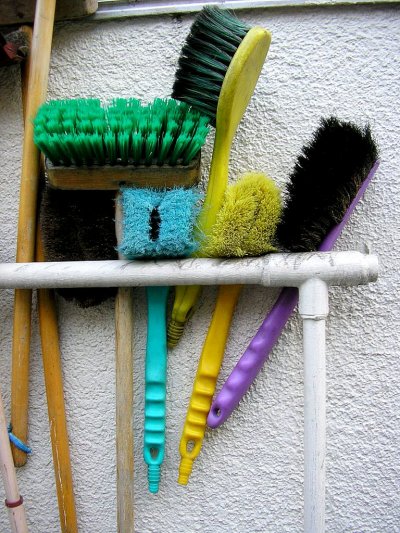Following our first guest blog post by “J.”, an African-American woman who spent four years working for the cleaning and handyman platform Handy before getting deactivated, I’m happy to share a second guest post. This time the contribution comes from “N.”, a Brazilian woman in her late 30s with a Portuguese passport who used to clean for Helpling. When I interviewed N. during my fieldwork in Berlin (mid-January 2019), I immediately noticed that she had very strong opinions about the platform, especially with respect to how it treats its cleaners. After finding out about her extensive experience as a blogger (which I think is noticeable in this post – part one of what she imagines as a two-part story), I asked her if she would be interested in sharing some of her experiences here and I was happy when she accepted my offer. While her take on Helpling and her own position is rather fierce and unsparing compared to other accounts I gathered, the issues she describes are nevertheless prevalent among the group of 25 Helpling cleaners I interviewed during my time in Berlin. In an upcoming research note, dedicated to a recent workshop on platform-mediated cleaning and care work I co-organized and which was attended by (among others) Helpling’s CEO, I plan to return to some of the concerns N. shares below. Insecurity comes in many forms, as will become clear in this guest blog post, and there is an urgent need for improvement in these areas.
Niels
I first learned about Helpling when I was studying German in Berlin, in the summer of 2017. Even though I was spending only the summer there, it seemed a good deal to earn around 11 euros per hour. I come from Brazil, where the exchange rate makes our currency, Brazilian Real, only 25% of a euro. It means if you get a minimum wage back home, you earn 250 euros per month. Although I had never worked for a minimum wage, (I am privileged enough to have completed two universities degrees) spending a couple of months in Germany turned out being terrible for my finances, so I thought “why not?”
I have European citizenship, which made me eligible to work. And at first, the Helpling crew was extremely helpful and attentive. After registering on their website, they called me, explained how things worked and sent me a series of videos showing how to clean. No official training was provided. The reason is obvious: if there were such a thing, it would make me an employee, not a self-employed person.
As any foreigner – and I bet many Germans as well – I was completely oblivious regarding any legislation. Helpling asked me for a copy of my passport, a police report (and I gave them one I got from Brazil, online, no questions asked), and a filled out form (in German). They sent me a template and I copied it, before uploading it on some government website. One would think in Germany you can apply for a Tax -ID merely filling out a form on their website. Silly me! But I will get to it later.
Soon my profile was online, and I was able to accept offers. I had never worked as a cleaner; everything I knew was from taking care of my own house. My first client was a company and I was impressed by how well I was treated. In Brazil, cleaners are invisible. The boss even shook my hand! It didn’t seem so bad after all. With that gig, I earned enough to pay 40% of my monthly transport ticket. It seemed fair. I had another cleaning scheduled for two days later and that’s when I learned that the rules were not so clear. I couldn’t make it and Helpling charged me 10 euros (what I would earn for an hour of work) for canceling it. They never said anything about this penalty.
In the meantime, I travelled back to Brazil and then returned to Germany a couple of months later. Then I decided to make cleaning my full-time job. It was not exactly a decision, it was more like a contingency plan, as finding a job in Berlin is much harder than it seems. And now I had to pay rent and groceries – it was not about enjoying summer anymore. Clients kept showing non-stop. Many times I had to turn off notifications on my phone – it was crazy how many offers I had per day! Obviously, I would take as many as I thought I could manage. I didn’t hate the job, but my body was suffering loads. There were days when my hands were swollen, I couldn't put my feet on the ground, and my back made me take some pain relievers. But money kept coming – and so did I.
Until, one day, I convinced my flatmate to start working for Helpling as well. When she was filling out all the forms, she asked me if I had my tax number yet. “What?”, I replied. I had no clue what she was talking about. That form I uploaded months earlier turned out to have no legal validity. First of all, it is mandatory for anyone living in Germany to register with the city council. I had no registration and, to be honest, it is super hard to find a place where they let you register, no matter how much you want to pay for rent. Once you are registered, you are obliged to have health insurance, costing at least 170 euros for self-employed people. I was living with my travel insurance, which I genuinely thought was enough. You also need to, of course, pay taxes, and to do so you need a different tax ID – this time a company tax number (I was not earning enough to do so monthly, but you have to file your tax return every year because you are considered a small company. If you are registered, of course, which I was not).
Seems complicated, doesn’t it? Now multiply this with every single document being in German. It was hell. And no one at Helpling ever, ever told me anything about it. Not even a FAQ just for show. Nothing. The easiness they advertised so much about, it simply didn’t exist. At that point, reality hit me hard, and I finally realized what I was for them: a machine that makes money flood into their account – as they took around 3 euros for every hour I worked. In the beginning, they promised they would pay us in advance if we needed. Suddenly, they said they had some kind of bank problem, and they wouldn’t be able to do so. I was paid fortnightly.
The thing is, I had already incurred expenses when I got paid: travel costs (81 euros per month), clothes, personal equipment (like gloves), food. Many times I spent a whole day with only one sandwich bought in between jobs, which I ate while traveling on the subway. It was hard work, and I know many people live like this in the world. I come from Brazil, after all. But being exposed to this in Germany, a first world country where work legislation is good! No holidays, no bank holidays, no pension?!
I was naive. I was stupid. They were the smart ones and I needed the money. Soon I realized they not only failed to provide any assistance in legal matters; they really didn’t care about cleaners in a much broader sense. But this is a theme for another post.

